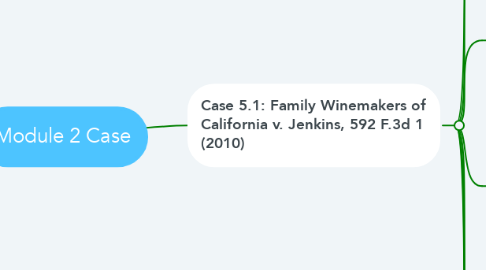
1. Case 5.1: Family Winemakers of California v. Jenkins, 592 F.3d 1 (2010)
1.1. Facts
1.1.1. Parties
1.1.1.1. Family Winemakers of California (Plaintiffs)
1.1.1.2. Massachusetts Alcoholic Beverages Control Commission (Defendants)
1.1.2. What Happened
1.1.2.1. Plaintiff challenged 2006 Massachusetts Statue that states wineries must be classified as either
1.1.2.1.1. Small Winery: obtain a small winery shipping license (if they produce less than 30,000 gallons per year).
1.1.2.1.2. Large Winery: Either rely on wholesalers to distribute their wine in-state, or obtain a large winery shipping license. Cannot have both though (if they produce more than 30,000 gallons per year).
1.1.2.2. Plaintiff argues the statute gives an advantage to in-state winery producers, who make up less than 2% of the country's wine production.
1.1.3. Procedural History
1.1.3.1. Plaintiff claims the statue was created for the purpose of giving an advantage to in-state wineries
1.1.3.1.1. The 2006 statue violates the Commerce Clause
1.1.3.2. Defendant claims the law does not contain any discriminatory purpose and/or effects
1.1.3.2.1. They also argue states are protected under the 21st Amendment
1.2. Issues
1.2.1. What is the legal question being asked?
1.2.1.1. Does the Mass. Gen. Laws ch. 138, § 19F unconstitutionally discriminate against interstate commerce? The two considerations cited to the court:
1.2.1.1.1. The two considerations cited to the court:
1.3. Rule of Law
1.3.1. Principles
1.3.1.1. De Nova review
1.3.1.1.1. Decision of the court was made without referencing previous court decisions, or assumptions
1.3.2. Legal Precedent Considered
1.3.2.1. Commerce Clause
1.3.2.1.1. Precedent Cited
1.3.2.2. 21st Amendment
1.3.2.2.1. Precedent Cited
1.4. Application
1.4.1. Family Winemakers of California (Plaintiffs)
1.4.1.1. Has the Burden of Proof
1.4.1.1.1. Plaintiff claims the statue was created for the purpose of giving an advantage to in-state wineries
1.4.2. Massachusetts Alcoholic Beverages Control Commission (Defendants)
1.4.2.1. Defendant claims the law does not contain any discriminatory purpose and/or effects
1.4.2.1.1. They also argue states are protected under the 21st Amendment
1.5. Conclusion
1.5.1. Court of Appeals, Chief Judge Lynch made two holdings
1.5.1.1. 1: the statue is in violation of the Commerce Clause
1.5.1.1.1. U.S.C.A. Const. Art. 1, § 8, cl. 3.
1.5.1.1.2. Precedent Cited
1.5.1.2. 2: The 21st Amendment doesn't protect the statute from invalidation under the Commerce Clause
1.5.1.2.1. U.S.C.A. Const. Art. 1, § 8, cl. 3; U.S.C.A. Const.Amend. 21
1.6. Impact
1.6.1. S.D. Farm Bureau, Inc. v. Hazeltine, 340 F.3d 583, 593-96 (8th Cir.2003)
1.6.1.1. The 13 Plaintiffs in the case claimed that Amendment E of South Dakota's Constitution prohibits out-of-state businesses from acquiring or obtaining land for farming.
1.6.1.1.1. Plantiff cited dormant clause within the Commerce Clause
1.6.2. Waste Mgmt. Holdings, Inc. v. Gilmore, 252 F.3d 316, 336 (4th Cir.2001)
1.6.2.1. Plaintiff claimed (5) Virginia statutory provisions regarding transportation and disposal were discriminatory.
1.6.2.1.1. Plaintiff cited dormant clause within the Commerce Clause
1.7. Importance
1.7.1. Impact of decision on business professionals
1.7.1.1. Does not invalidate established state regulations that give small businesses equal opportunity to be competitive with larger firms.
1.7.1.1.1. Business professionals need to ensure their respective state laws do not have any prohibiting economic interests effecting their business
1.7.1.2. State laws cannot prohibit fair Interstate commerce interests on the grounds of favoring in-state firms - regardless of the size of out-of-state firms.
1.8. Influence
1.8.1. Dormant Clause
1.8.1.1. Business Practice Influence 1
1.8.1.1.1. S.D. Farm Bureau, Inc. v. Hazeltine, 340 F.3d 583, 593-96 (8th Cir.2003)
1.8.1.2. Business Practice Influence 2
1.8.1.2.1. Mass. Gen. Laws ch. 138, § 19F
